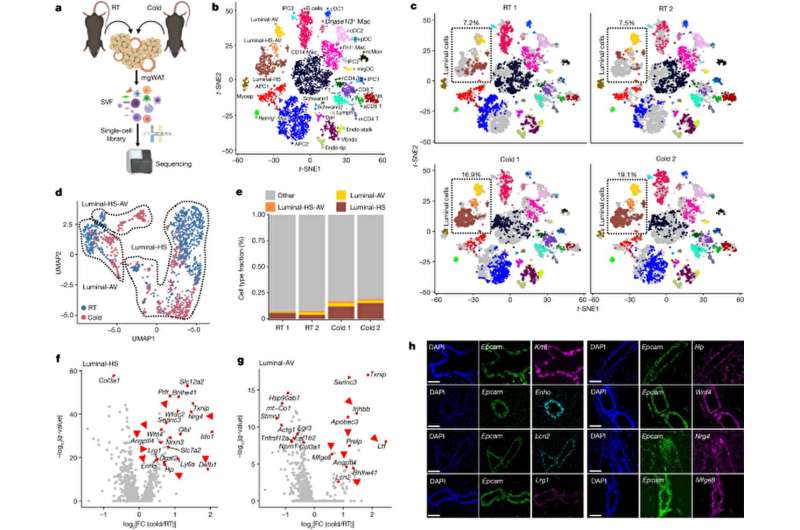This article has been reviewed according to Science X's editorial process and policies. Editors have highlighted the following attributes while ensuring the content's credibility:
fact-checked
peer-reviewed publication
trusted source
proofread
Researchers uncover how mammary glands control overall energy balance and fat metabolism

An Icahn School of Medicine at Mount Sinai study sheds light on the intricate interplay between mammary adipose (fat) tissue and breast health, and offers exciting possibilities for understanding breast development, lactation, cancer, and obesity and related metabolic disorders.
The study was published in Nature.
The researchers discovered a new family of locally secreted and locally acting molecules in the breast called "mammokines" that contribute not only to normal mammary biology, but to overall fat cell physiology and energy balance control.
Mammary adipose tissue has long been recognized for its essential role in breast biology. It consists of many different cell types, including fat cells (adipocytes), immune cells, sympathetic nerve fibers, and mammary epithelial cells forming a milk-producing ductal system. Mammary adipocytes play important roles in organizing mammary ducts, and the reverse is true as well.
The new studies reveal an unexpected role for nerve-activated ductal cells in mammary adipocyte metabolism and heat generation. These mammary duct-secreted mammokines play an important role in controlling mammary gland fat abundance and could potentially orchestrate critical processes involved in breast development, lactation, and overall whole-body metabolic regulation.
The findings thus have important implications for breast cancer, lactation-related disorders, newborn health, and metabolic syndromes linked to mammary adipose dysfunction.
"The discovery of mammokines is a significant milestone in our quest to comprehend the complex interplay between mammary adipose tissue and breast biology," says Dr. Rajbhandari "This breakthrough opens up new avenues for developing targeted interventions to improve breast health and combat related metabolic disorders."
The research team is currently focused on working to further identify new mammokines and characterize each of them. Their primary aim is to decipher the precise roles of these mammokines and determine whether they regulate systemic glucose and insulin homeostasis through communication with the brain, liver, and pancreas. Additionally, the team is exploring potential therapeutic applications for diseases related to the breast and metabolism.
"This work holds enormous promise for future advancements in women's health and metabolic research and the development of personalized treatment strategies based on mammokine profiling," said Andrew Stewart, MD, Director of the Diabetes, Obesity, and Metabolism Institute at Icahn Mount Sinai.
More information: Prashant Rajbhandari, Mammary duct luminal epithelium controls adipocyte thermogenic programme, Nature (2023). DOI: 10.1038/s41586-023-06361-5. www.nature.com/articles/s41586-023-06361-5





















